Sproutingfam.com is supported by its readers. If you purchase through a link on my site, I may earn a commission. Learn more
Homemade Clove & Cinnamon Mouthwash Recipe
Here we make a simple homemade cinnamon mouthwash recipe with cinnamon sticks, cloves, fresh mint and salt. If you’re online searching for DIY natural mouthwash recipes, then chances are you already know about the downsides of powerful antiseptic mouthwashes.
Below I briefly share about the dangers of commercial antiseptic mouthwashes, share step-by-step directions for a great DIY natural mouthwash recipe, and then I share a bit about the recipe’s ingredients.
Enjoy!

Antiseptic Mouthwash Linked To Heart Health Risks
Because of heart health risks associated with antiseptic mouthwash, we’ve just started making our own natural mouthwashes.
Here is Nathan Bryan, Ph.D on heart health risks associated with antiseptic mouthwash use:
“Poor oral hygiene, the use of antiseptic mouthwash or antibiotics can kill these commensal bacteria and disrupt nitric oxide production putting patients at risk for CVD.
For example, there is strong data that demonstrates that antiseptic mouthwashes may eliminate “bad breath,” but at the same time, they raise a significant risk of killing “good”, i.e. beneficial, oral bacteria that in turn, raises blood pressure.
The rise, as much as 26 mm Hg, causes essential hypertension in healthy individuals.”
– Nathan Bryan, Ph.D
Step-By-Step Clove & Cinnamon DIY Mouthwash Recipe Directions
This Clove and Cinnamon mouthwash is the first of the handful of natural mouthwash recipes we’ve been trying out. It’s extremely easy and fast to make.
It’s basically a decoction.
You have to simmer the ingredients for 20 minutes.
I have a post on the differences between infusions, teas and decoctions goes more into it, but all a decoction is is when you simmer plant parts in the water for a while (as opposed to teas that get steeped not simmered).
Cinnamon you would think operates the same, but it is actually able to be infused or steeped just as tea. However, cinnamon can also be decocted. So these both are decocted in this recipe, while the mint is infused at the very end.
Other than that, just let it cool down a bit and it’s ready to bottle up and keep in your bathroom for daily usage.
Make sure to lid the pot.
In order to capture all the beneficial volatile oils within the clove and cinnamon while it decocts/simmers, you need to cover the pot. (I’ll update the images to accomodate this, but I want to alert anyone who reads this now first).
Homemade Cinnamon Mouthwash Recipe (Plus Cloves, Salt & Fresh Mint)
Equipment
- 1 steel pot for boiling water, with lid
Ingredients
- 10 g Cinnamon sticks Cinnamon sticks, not powder
- 2 tbsp Cloves Dried whole cloves, not powder
- 2 tbsp Sea salt Any sea salt (we use Himalayan)
- 1,000 ml Water Drinking water (non-tap preferred)
Instructions
- Bring water to a boil in a pot1,000 ml Water
- Add in cinnamon sticks10 g Cinnamon sticks
- Add in cloves2 tbsp Cloves
- Add in the sea salt2 tbsp Sea salt
- Simmer the salt, cinnamon sticks and cloves for 20 minutes while covered.
- Turn off the fire, smash your mint leaves and add them next. Keep pot covered.
- Let sit covered with heat turned off for 5 minutes, letting the mint leaves infuse.
- The cinnamon mouthwash recipe is complete and ready to pour into container
Video
Notes
DIY Cinnamon & Clove Mouthwash Recipe Summarized
Low boil the cinnamon sticks, cloves and salt together for 20 minutes. Make sure to put a lid on it. Finish with the fresh mint right after turning off the heat. Cover the pot for 5 minutes, then it’s finished and ready to pour into your jar or container. We poured this recipe’s finished cinnamon mouthwash into a cup so you can see what it looks like. But normally I’d pour it into a large glass jar with lid, such as a finished jar of olives. Does it have to be refrigerated? It can be, but this does not have to be refrigerated. We keep a glass jar in each bathroom. How long does it last at room temperature? The safe answer here is 2 weeks. Clove water lasts for 2-weeks refrigerated. But because salt is a natural preservative, I believe it is this that naturally extends its shelf life. It sits fine in room temp for at least a month, but we always go through it pretty fast, so its absolute shelf-life is something I can’t comment on. At the time of this recipe we were in Oaxaca, Mexico. In the subtropical heat of a beach town called Huatulco. Our bathrooms never felt AC, yet this cinnamon clove mouthwash never went bad.About The Homemade Clove Mouthwash Recipe Ingredients
We’ll wrap up this post with a closeup image of the ingredients used in this mouthwash recipe.
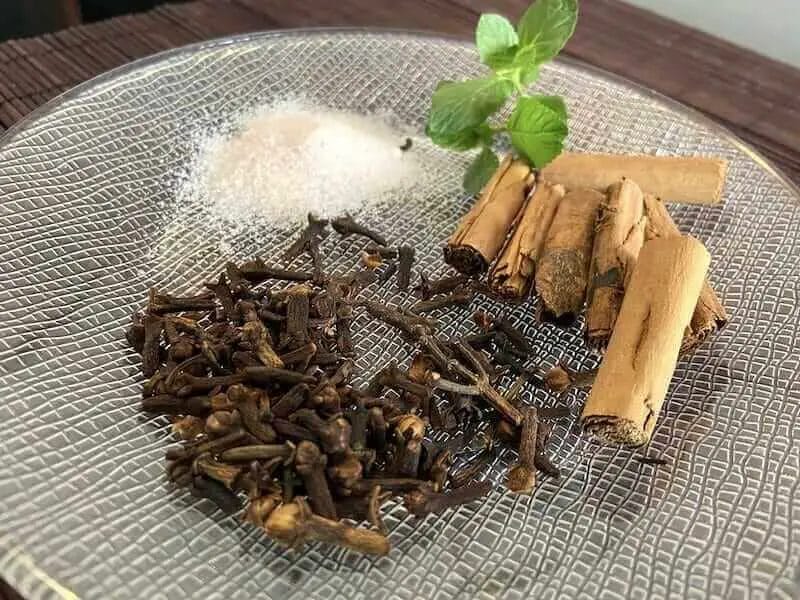
Is Cinnamon Good For Oral Hygiene?
Cinnamon is known as a “spice”.
When the inner bark strips of the Cinnamomum tree are dried out, they coil into rolls which we know as cinnamon sticks.
Why Cinnamon for mouthwash recipes?
The following quote is from a PubMed Central review on cinnamon’s applications in dentistry:
Cinnamon EO, cinnamon extracts, and pure compounds show significant antimicrobial activities against oral pathogens and could be beneficial in caries and periodontal disease prevention, endodontics, and candidiasis treatment.
– S. Yanakiev, Effects of Cinnamon (Cinnamomum spp.) in Dentistry: A Review
Cassia vs Ceylon Cinnamon
You’ll need to choose between Ceylon and Cassia. Both work great for this homemade mouthwash. Cassia has a stronger flavor, while Ceylon is more mild and sweet.
Ceylon is better to use medicinally because it has less coumarin, something that can be bad for you if you have too much. The sticks I have here on this clove and cinnamon mouthwash recipe are Cassia.
Where To Buy Organic Cinnamon Sticks?
Just like you will find with cloves and Himalayan pink salt, where you source your cinnamon will matter. Luckily, there are several reputable suppliers you can find online.
CEYLON
These guys say they harvest their cinnamon sticks from a USDA certified organic farm in Sri Lanka:
- WHAT IS REAL OR TRUE CEYLON CINNAMON: Most…
- CEYLON CINNAMON HAS A LOWER COUMARIN RATE COMPARED…
- WHY SWEETNESS AND FLAVOR VARY IN CEYLON CINNAMON:…
- BEST WAY OF GETTING AROMA: We recommend grinding…
CASSIA
Starwest Botanicals has a good-quality Cassia cinnamon (Cinnamomum burmanii) product.
It will give your mouthwash a nice kick moreso than the Ceylon, in case that is something you miss from the antiseptic washes.
- Botanical Name: Cinnamomum burmanii (Indonesia)….
- Sweet and mellow, Korintje cinnamon is the type of…
- It is by far the most common in America, so this…
- Fragrant Korinjte cinnamon is as strong as China…
- It is a good baking cinnamon and for sprinkling on…
What About Cloves? Why Use Them For A Mouthwash?
Mostly well known for adding unique flavor to meals, cloves are also used for oral care herbal recipes such as with this homemade clove and cinnamon mouthwash recipe.
Clove (Syzygium aromaticum) is a tropical tree that comes from the Maluku Islands in Indonesia.
Cloves are the dried flower buds harvested from the Clove tree (Syzygium aromaticum). They’re harvested while still in bud form, and once dried, these clove tree flower buds become the signature spice we know today as clove.
Quick Clove History: This extremely popular spice is said to originate from the “Spice Islands” near China. After the plant’s discovery, it made its way through the rest of Asia and into Europe and the west.
Beneficial Compounds Within Clove
Dried cloves are ground or used whole just as often outside of the kitchen, for a variety of wellness applications.
I mentioned above some of clove’s top compounds, with Eugenol being the distinct and main volatile oil found in clove. In this PubMed review on Clove essential oil and its applications, they mention a ratio and then list out several on the lower end that are also beneficial.
Eugenol is the major compound, accounting for at least 50%. The remaining 10–40% consists of eugenyl acetate, β-caryophyllene, and α-humulene.
From dental health to digestive, respiratory, anti-inflammatory, antimicrobial and more, when it has anything to do with oral health, clove buds are a top choice herb.
Where To Buy Organic Cloves?
Like with the cinnamon, do make sure you source 100% organically grown cloves.
You can find various organic spice brands on Amazon or other online marketplaces.
Simply Organic is one affordable and reputable spice brand that sell organic whole cloves.
- WHOLE CLOVES – Intensely aromatic and richly flavorful, Simply Organic…
- ADAPTABLE INGREDIENT – Cloves are useful for various purposes, but are…
- ORGANIC FROM SRI LANKA – Our whole cloves are grown and harvested in…
- PURE AND POTENT FLAVOR – Simply Organic believes in pure and potent…
- ABOUT US – Simply Organic is a 100% certified organic line of spices,…
I like these from Starwest Botanicals better.
It’s one-pound bag of good quality S. aromatyzum.
- Latin/Botanical Name – Syzygium aromaticum
- Certified Organic by QAI – In accordance with the USDA National Organic Program Guidelines
- Kosher Certified
A Powerful Oral Care Combo: Clove & Cinnamon
An article titled by Texas-based Dental Group titled 6 Essential Oils For Healthy Gums & Teeth shares how both Cinnamon and Clove are excellent medicinal herbs for oral health.
Clove is especially essential for oral health. Clinical research indicates that clove oil can relieve tooth pain and bad breath, as well as help reduce gum disease! Clove oil also has the natural ability to restrict the development of bacteria and can help fight mouth and throat infections.
– Dental Group Of Amarillo
As you can see, these two ingredients are ideal for oral care products.
And these are just two of many potential mouthwash ingredients!
Let’s take a look at Himalayan Salt next..
Himalayan Salt
Himalayan salt comes from Pakistan, from the Khewra Salt Mines, the second largest salt mine in the world today that was discovered by Alexander the Great in 320BC.
And in case you are wondering, Canada has the largest one; the Sifto Salt Mine in Goderich, Ontario.
Not All Himalayan Sea Salt Is Equal
With increased demand in recent years, more salt is needed from these mines. That’s where the issues with this salt comes from. From their method of explosive mining. How they mine it. Let alone what they do to it during processing.
So what they do is explode huge rocks of it out and then they sell these massive crude pink salt rocks to whoever wants them. It just gets worse from here as more explosives can be used to break these apart.
Regardless of the controversy, we’ve been transitioning away from Himalayan salt after learning about Celtic sea salt.
If you do purchase Himalayan salt, find a reputable company.
SaltWorks has a good Himalayan pink salt.
- VERSATILE GRAIN SIZE ideal for cooking, baking & salt shakers
- COMPARABLE to table salt grain size
- DISSOLVES QUICKLY and fully, mix Ancient Ocean with dried herbs &…
- ETHICALLY SOURCED and certified authentic from the most mineral rich…
- KOSHER CERTIFIED, not to mention organic compliant, all-natural,…
Final Thoughts
In this DIY mouthwash recipe post we shared why we no longer use antiseptic mouthwashes, and instead choose natural oral care solutions like this easy DIY cinnamon and clove mouthwash.
This mouthwash is not too minty though. It’s salty and earthy.
So if brown, semi-salty herbal waters throw you off as a mouthwash, you may prefer one that resembles more closely the antiseptic mouthwashes you’d grown accustomed to. But chances are anyone reading this will not think twice about this stuff.
We hope to explore and experiment with new versions of this one as well as other variations using clove, cinnamon and other medicinal herbs for oral health. Perhaps we can get one that is powerfully minty, next.
We’ll update this post with links to future natural mouthwash recipes as we make them.
Thanks for coming by the Sprouting Fam blog!
Let us know if you have any questions on this Cinnamon Mouthwash Recipe!
RECOMMENDED: How To Use Andrographis Herb To Help Treat Pediatric Fever
Last update on 2025-04-03 / Affiliate links / Images from Amazon Product Advertising API

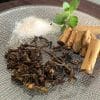
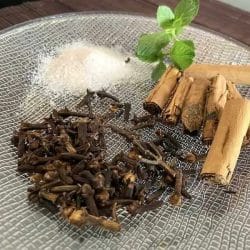
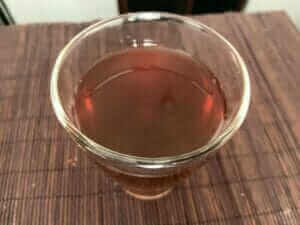








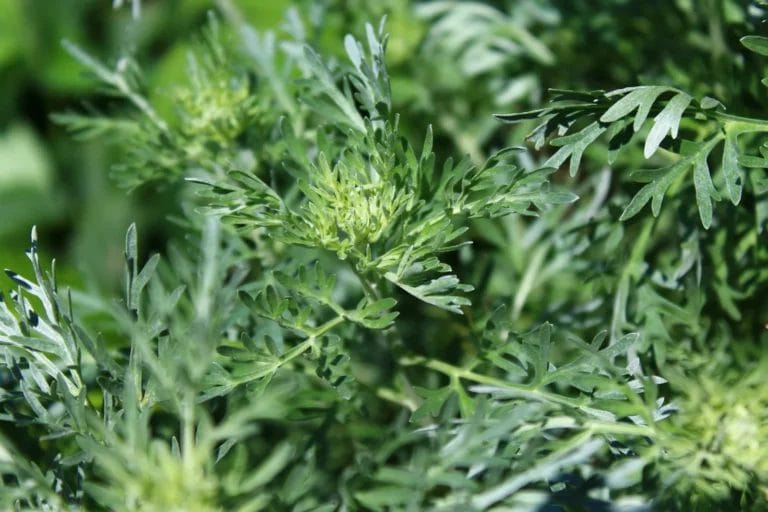

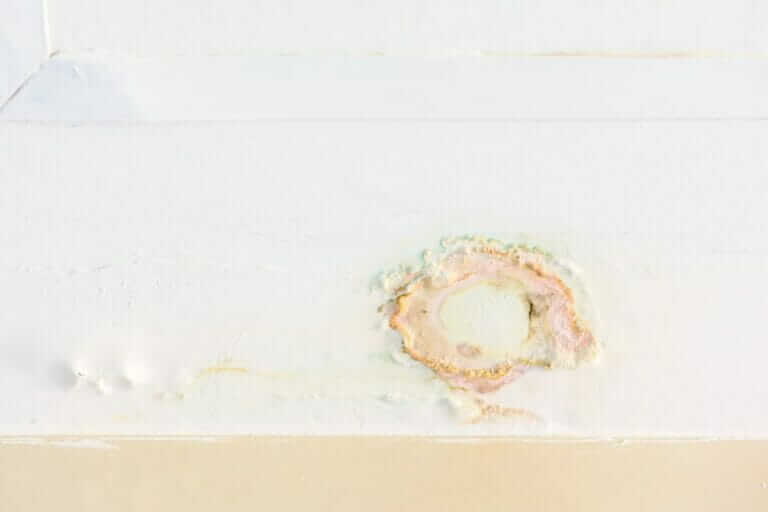
Re: cinnamon clove mouthwash. Have you noticed a greenish broeWn darkening on your teeth?
I’ve never whitened my teeth. I do have some brown tint from coffee or maybe other foods. Been drinking a cup or 2 most days for well over a decade. But clove mouthwash has only helped it if anything. Are you seeing green/brown darkening? I will look into this subject, plus into natural teeth whitening potential solutions. Cheers. – John
Hi! You state that this is good for at least a month at room temp. How would I know if it is starting to go bad? Want to be sure I don’t let it overstay it’s welcome! Thanks!
Hi Katie, Normally for something like clove water it would last 2 weeks or so refrigerated. Salt is a natural preservative, so I think it’s the clove mouthwash’s salt that preserves it out further than this. Thanks a ton for coming by and for asking. Have a good one!
It would be very helpful if you suggested how many cinnamon sticks to use as opposed to a weight in grams; that would simplify things for people like me who do not have a scale to measure such small amounts of weight. Thank you, Katie
Thanks for this suggestion Katie.
I just do grams as that’s precise.
7 cinnamon sticks seems a bit vague because.. how thick? what’s their length? etc.
If I use a specific packaged brand, and suggest a number of that exact brands’ cinnamon sticks, then that’d good.
I’ll try to incorporate both for those who may prefer just the exact number in grams (in case there are others besides me).
Correct labelings of ingredients is a topic I will look into more soon now too.
THank you again very much for this suggestion.
Have a good one.
Thanks for your response John. I guess I’ll just wing it for now 🙂
This recipe here used 7 cinnamon sticks, but I’ve thrown in more and it was good. So I’d start with 7 and then go up or down depending on what you or your family likes. Often I’ll throw in probably 10 or so. I’ve never done enough to make it taste bad or bitter, but I’ll try one with 20 and see how it goes. I can update this comment thread when I try that. Setting reminder in one of my many reminder tools to do this !! Cheers
Thanks for your time and effort in this matter and pursuit. Like so many, I too loved the Jason brand of this original mouthwash, used for years, and turned all family members on to it. SO disappointed that in last couple years it disappeared from shelves of natural food/health stores. The similar versions sold on Amz seem to have problems of one kind or another, and are fake or Jason sold manufactoring rights to unscrupulous ppl who are making a very inferior product. (And also became absurdly expensive to boot.)
The original mouthwash incorporated XYLITOL (as well as cinnamon and cloves), and is a scientifically-proven antibacterial and one of the best. Have you tried adding xylitol to your formula?
As a person with mildly-high blood pressure, as so many are,, I avoid regular table salt as much as possible, and think that a quite salty mouthwash would not be advisable for most ppl. Do you think cutting way back on salt is feasible and safe–and just keeping a large container in the fridge and a small jar at the sink?
Your thoughts and comments will be much appreciated.
Hi Peggy, thank you for the comment. Definitely go for sea salt when you make this because table salt has no nutritional value. But as far as the BP, I can’t comment on how it would affect it, however, the absorption of salt through the mucosal lining in your mouth will be minimal. Probably a bit more than swimming at the beach, because it’s in your mouth, but it’s not the same as if you were consuming it. You can definitely do less salt, but the sea salt is a main ingredient and comes with plenty benefits for using it that I think would even help the BP. Having a proper pH balance in your mouth and getting bacteria wiped out naturally by the sea salt would only improve overall wellness, high bp or not it would help both the same – but this is purely opinion based on the fact that a minimal amount gets absorbed. Thanks for the xylitol tip. I haven’t tried it. I don’t think that stuff existed the last time I bought a pack of chewing gum haha. Anyways please consider Sea Salt over iodized table salt. And please look into how small the absorption is. With it being a minimal issue, not major, I personally wouldn’t think twice about it, but that’s purely opinion! Thanks and have a good one!
Hope you have time to research XYLITOL (mentioned above) as a proven dental caries preventative, including a good NIH study and meta-analyses.
Peggy